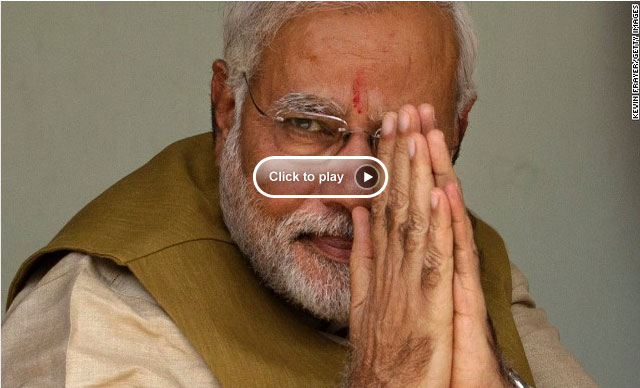- Biography
- Books
- Commentary
- Newspapers
- Asian Age
- Bloomberg Quint
- Business Line
- Business Standard
- Dainik Bhaskar (Hindi)
- Divya Gujarati
- Dainik Jagran (Hindi)
- Divya Marathi
- Divya Bhaskar
- Economic Times
- Eenadu (Telugu)
- Financial Times
- Hindustan Times
- livemint
- Lokmat, Marathi
- New York Times
- Prajavani (Kannada)
- Tamil Hindu
- The Hindu
- The Indian EXPRESS
- Times of India
- Tribune
- Wall Street Journal
- Essays
- Interviews
- Magazines
- Essays
- Scroll.in
- Newspapers
- Speaking
- Videos
- Reviews
- Contact
Modi a ‘calculated risk,’ says Indian business leader: CNN
| May 19, 2014 - 00:00
India is taking a “calculated risk” with the election of Narendra Modi as prime minister, Indian business leader and public intellectual Gurcharan Das told CNN’s Christiane Amanpour on Monday.
“It’s obviously a risk you take when you bring in a strong person. But I believe that India has enough constraints of a pugnacious press, a fiercely independent judicial system, and a disobedient people, that I think the chances of getting a dictator are diminished as a result of some of these.”
Modi, leader of the Bharatiya Janata Party, claimed victory in a landslide election last Friday. He has drawn praise for the economic revitalization of Gujarat, his home state, but criticism over his Hindu nationalism and alleged role in anti-Muslim mob violence a decade ago, when he was chief minister of Gujarat.
Das voted for Modi, but says the decision “took a lot of agonizing.”
“I feel he’s grown. I hope he has grown. And I feel we are taking a risk, but it’s a calculated risk that the country is taking.”
The potential benefit of that risk, according to Das, is an economic kick-start for India.
The country has seen lacklustre GDP growth, for a developing country, at just under five percent annualized growth in 2013. That is far less, for example, than China’s 7.7% last year.
Modi, Das told Amanpour, is the country’s “best chance” to revive growth.
“His core competence is the ability to implement, to get things done. Indians are big talkers, but they are not big doers.
“And for the first time I think we have a person who is a genuine – who is a leader in that sense that he monitors projects, that he gets into the messy details. He motivates people. He encourages people. And then he holds them accountable.”
India’s major problem is that government is “all gummed up,” Das said.
“There are hundreds and hundreds of projects that are paralyzed and stopped because of various reasons. And so just doing that itself, without major reforms, just getting things done, I think, will get the economy kick-started.”
Looming over the excitement remains Modi’s role in Gujarat’s late-2001 violence. He was critized for not doing enough to stop the violence, in which more than 1,000 people – mostly Muslims – were killed.
A Supreme Court-ordered investigation absolved him of blame last year. Modi subsequently expressed regret over the riots but was criticized for not apologizing.
Apologizing, Das said, would be the “wise” and “magnanimous” thing to do.
“In his very first speech, he said that he’s a leader of all Indians. But he needs to go further. And this is why, frankly, I agonized about voting for him.”
“I feel that perhaps he – that he has changed,” Das said. “Gujarat used to have a riot every year. For the last ten years…there’s been no riot.”
The threat India faces, Das said, is not China, nor long-time rival Pakistsan.
“The threat is that the Muslim minority of India has been…the least fundamentalized Muslim minority in the world, and we’d like to keep it that way. And let’s hope he [Modi] doesn’t do anything that would change that.”


